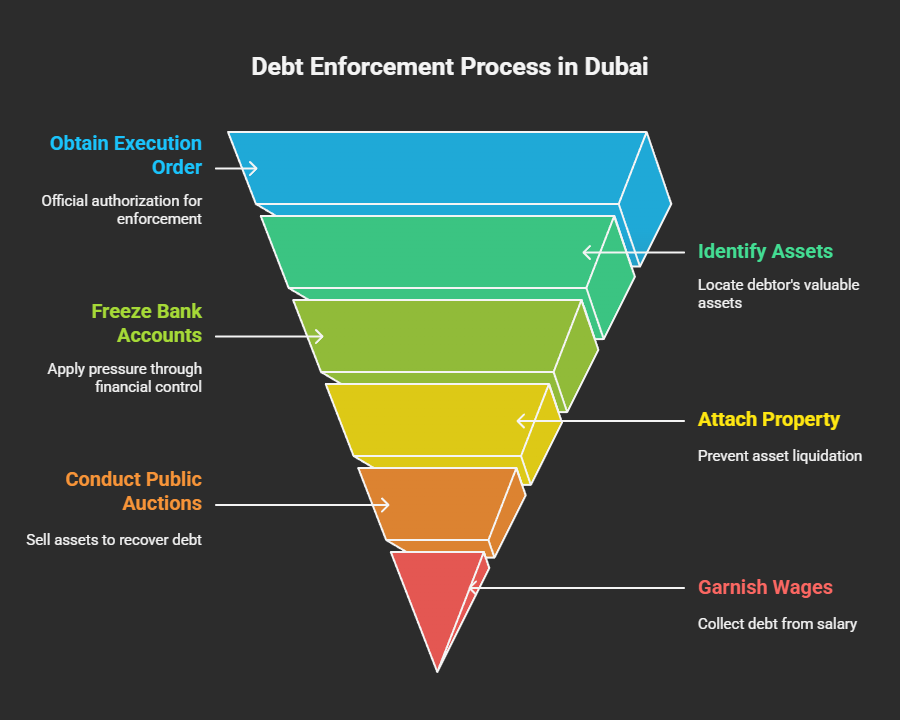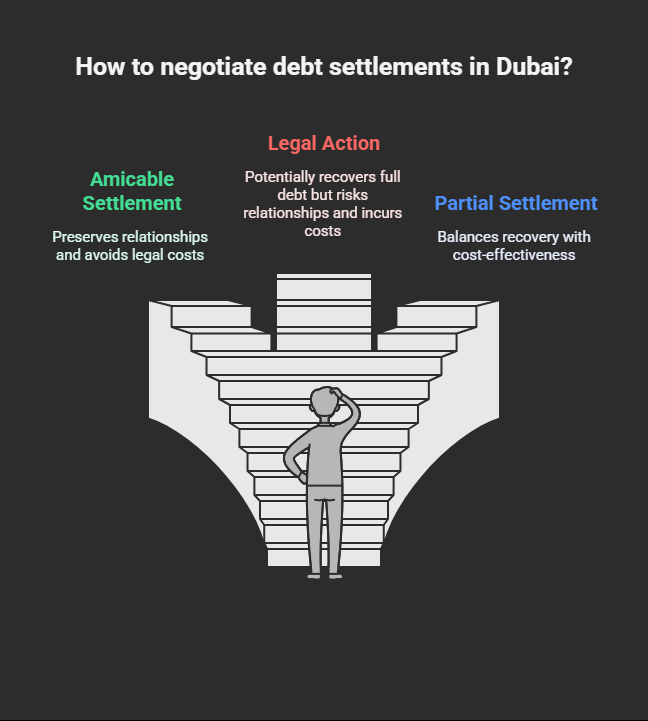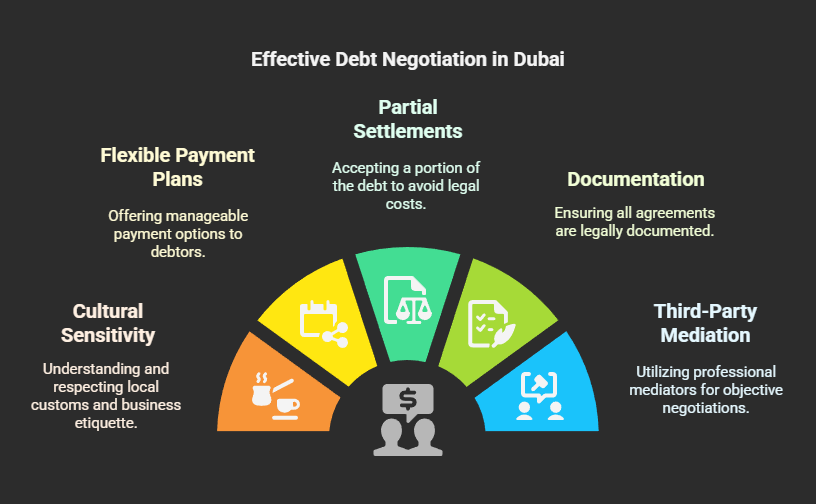Navigating Debt Collection in Dubai: A Structured Approach
The debt collection process in Dubai follows a structured framework governed by UAE laws and cultural norms. For businesses facing unpaid invoices, here's a quick overview of the debt collection procedure:
- Initial Communication - Contact the debtor with payment reminders
- Formal Demand Letter - Send an official legal notice with payment deadline
- Negotiation Phase - Attempt amicable settlement and payment plans
- Legal Action - File a case in the competent court if negotiations fail
- Judgment Enforcement - Execute court orders through asset seizure or bank account freezing
In Dubai's dynamic business environment, unpaid debts can severely disrupt cash flow and undermine financial stability. For foreign business owners particularly, navigating the local debt recovery landscape presents unique challenges due to language barriers, unfamiliarity with UAE legal systems, and cultural differences in business practices.
The UAE's debt collection framework combines elements of civil law, Sharia principles, and specific commercial regulations to create a comprehensive system that protects both creditors and debtors. According to industry data, nearly 95% of debt collection cases can be resolved without court intervention when handled properly, highlighting the importance of understanding proper procedures from the outset.
For businesses operating in Dubai, knowing when and how to initiate debt recovery is crucial. The general statute of limitations for debt claims in the UAE is 15 years, providing a substantial window for action, but early intervention typically yields better results.
Dr. Hassan Elhais, a legal expert in UAE debt collection, notes: "The most effective approach to recover outstanding debt is without resorting to the courts." This underscores the value of professional debt collection services that understand the nuances of local procedures and can steer them efficiently.

Common debt collection process in dubai vocab:
Understanding the Debt Collection Process in Dubai
When you're trying to collect a debt in Dubai, knowing how the system works can make all the difference between success and frustration. The debt collection process in Dubai gives creditors a generous 15-year window to pursue outstanding debts in most civil cases. That said, the sooner you take action, the better your chances of seeing that money again!
Dubai's approach to debt recovery begins with a handshake before bringing out the legal paperwork. This friendly-first approach isn't just about being nice – it's a smart business strategy in Dubai's relationship-centered business culture. After all, today's debtor might be tomorrow's valuable business partner.
Imagine sending a message like this: "Good morning Ahmed! Just a friendly reminder that invoice #237 is now past due. Would you be able to arrange payment this week? I've attached a copy for your reference." This kind of polite but clear communication sets the right tone when starting the collection process.
If your friendly reminders go unanswered, don't worry – the process gradually escalates to more formal steps, including legal notices and potentially court action if necessary.
One thing to keep in mind: Dubai's business scene is incredibly diverse. Communications in both Arabic and English are often needed to ensure everyone's on the same page. At Collection Agency Dubai, our team speaks multiple languages to make sure nothing gets lost in translation, giving your recovery efforts the best possible chance of success.
The Legal Framework Supporting Debt Collection
Dubai's debt collection system doesn't operate in a legal vacuum – it's built on several solid pillars of legislation that protect both creditors and debtors:
The UAE Civil Transactions Law (Federal Law No. 5 of 1985) creates the foundation for all civil obligations and contracts, including the basics of debt recovery. Working alongside it, the UAE Commercial Transactions Law (Federal Law No. 18 of 1993) specifically addresses business-to-business debts, giving companies clear pathways to recover what they're owed.
Sharia Law principles add another dimension to Dubai's legal landscape, particularly regarding interest and ethical financial dealings. These principles emphasize fairness and respect in all transactions.
The UAE Central Bank also plays its part by issuing guidelines that keep debt collection practices in check, especially for banks and financial institutions. And for serious cases, the UAE Penal Code (Federal Law No. 3 of 1987) can impose criminal penalties – like in cases of bounced checks.
Together, these legal frameworks create a comprehensive system that's both fair and effective. The Civil Transactions Law lets creditors take legal action when debtors don't pay up, while the Commercial Transactions Law offers specific remedies custom to business situations.
Remember though – following proper procedures is essential. You'll need to provide proper notice to the debtor, attempt friendly settlement first, and follow court procedures correctly if things escalate. Skip any of these steps, and you might face delays or even have your case dismissed.

Initial Steps in the Debt Collection Process in Dubai
The journey to recovering your money begins with several crucial first steps that can dramatically affect your chances of success:
Reaching out personally is always the starting point. A phone call, email, or face-to-face meeting reminds the debtor about what they owe in a professional way. Keep records of all these communications – they might prove valuable later.
If that friendly nudge doesn't work, it's time for a formal demand letter. This document should clearly spell out how much is owed, when it's due, and what might happen if payment isn't made. These letters carry extra weight when they come from a professional Debt Collection Agency Dubai or legal representative.
Before heading to court, try negotiating a payment plan that works for both parties. Maybe the debtor can pay in installments, or perhaps a partial settlement is possible. We've found that offering some flexibility often leads to successful recovery – and preserved business relationships.
Throughout this process, keep meticulous records of everything: contracts, invoices, all correspondence, and any acknowledgment of the debt from the debtor. This evidence becomes your best friend if legal action becomes necessary.
Cultural awareness plays a surprisingly important role in debt collection success. Dubai brings together business people from countless backgrounds, each with different expectations about debt and payment. Understanding these cultural nuances often makes the difference between getting paid and getting frustrated.
At Collection Agency Dubai, we approach these initial steps strategically, using our multilingual team to overcome language barriers and our deep understanding of local business customs to steer cultural differences effectively. With over 20 years of experience in Dubai's unique business environment, we've refined our approach to maximize recovery while minimizing disruption to your business relationships.
Roles of Debt Collection Agencies in Dubai
When businesses in Dubai face unpaid invoices, professional debt recovery specialists become invaluable allies in the financial recovery journey. The debt collection process in Dubai can be complex, which is why many companies turn to specialized agencies to steer these waters.

Think of debt collection agencies as the expert navigators of Dubai's financial recovery landscape. They don't just chase payments – they build bridges between creditors and debtors, finding pathways to resolution that might otherwise remain hidden.
These agencies employ professionals who understand both the legal intricacies and cultural sensitivities unique to Dubai. This dual knowledge is crucial because recovering debt here isn't just about following laws – it's about understanding the business culture where relationships and reputation matter tremendously.
When you partner with a collection agency, you're essentially outsourcing the entire communication burden. Imagine no more awkward calls or tense emails with clients who haven't paid! The agency handles all debtor interactions professionally, allowing you to maintain positive business relationships even during difficult financial situations.
Documentation is another area where professional agencies shine. They maintain meticulous records of every interaction, payment promise, and negotiation attempt. This paper trail becomes invaluable if your case eventually requires legal action – and it's something many businesses struggle to maintain on their own.
The numbers speak for themselves: businesses that engage professional debt collection services typically see recovery rates increase by up to 25% compared to handling collections in-house. This difference becomes even more pronounced in Dubai's multicultural business landscape, where language barriers and cultural differences can complicate recovery efforts.
At Collection Agency Dubai, our two decades of experience have taught us that successful debt recovery is as much an art as it is a science. Our multilingual team steers cultural nuances with ease, while our legal experts ensure all actions remain within the bounds of UAE law.
For businesses seeking Commercial Debt Recovery Services, professional agencies offer specialized expertise in handling complex B2B situations that often involve larger sums and require industry-specific knowledge.
Verifying the Legitimacy of a Debt Collection Agency
Not all debt collection agencies in Dubai are created equal, and choosing the wrong one can lead to wasted time, lost money, and potential legal complications. Verifying legitimacy should be your first step before engaging any agency.
Legitimate collection agencies in Dubai operate with proper accreditation from the UAE Central Bank. This official recognition signals that the agency adheres to established regulations and operates within legal boundaries. Before signing any agreement, ask to see evidence of this accreditation – reputable agencies will happily provide it.
Professional licensing and certification are equally important indicators of legitimacy. These credentials demonstrate that the agency has met industry standards and is committed to ethical practices. Don't hesitate to ask about specific qualifications and how long the agency has been operating in Dubai.
Transparency about fees is another hallmark of legitimate agencies. Most reputable collection services in Dubai work on contingency – meaning they only get paid when they successfully recover your money. The industry standard typically ranges from 10-30% of recovered amounts, depending on the age, size, and complexity of the debt. If an agency requires large upfront payments or has hidden fees, consider it a red flag.
The debt collection process in Dubai must follow ethical guidelines. Legitimate agencies never resort to harassment, threats, or intimidation tactics. Instead, they rely on professional communication, legal knowledge, and negotiation skills to achieve results. During your initial consultation, pay attention to how the agency representatives discuss their approach – their language should emphasize professionalism and respect for all parties.
"We don't just recover debts; we help preserve business relationships," explains Mohammed Raheem, a senior debt recovery specialist. "In Dubai's business culture, how you collect is often as important as what you collect."
Before making your final decision, research the agency's track record. Ask for client testimonials, check online reviews, and if possible, speak with current or former clients. A reputable agency like Collection Agency Dubai will have a portfolio of success stories and references available for potential clients.
For businesses requiring Corporate Debt Collection Dubai services, it's particularly important to select an agency with specific experience in your industry. Corporate debt collection often involves complex contracts and larger sums, requiring specialized expertise that not all agencies possess.
Partnering with an unlicensed or unethical collection agency can backfire spectacularly. Beyond failing to recover your money, it could expose your business to legal liabilities and damage your reputation in Dubai's close-knit business community. A little due diligence upfront can save you significant headaches down the road. For more information about ethical debt collection practices, you can refer to the UAE Ministry of Economy guidelines on business practices.
Legal Consequences for Debtors Who Fail to Pay
In Dubai, failing to pay your debts isn't something to be taken lightly. The UAE legal system takes financial obligations very seriously, with consequences that can significantly impact a debtor's life and freedom.

What happens when someone doesn't pay their debts in Dubai? The answer might surprise those accustomed to Western debt collection practices.
First and foremost, creditors can take legal action through civil or commercial courts. These proceedings typically result in judgments that legally compel debtors to pay. But that's just the beginning.
Once a judgment is obtained, the courts can order asset seizure. This means a debtor's bank accounts, vehicles, property, and other valuables may be confiscated to satisfy the outstanding debt. Imagine coming home to find your car being towed away or finding your bank account suddenly frozen – these scenarios are very real possibilities.
For employed debtors, wage garnishment becomes a concern. The UAE Labor Law allows for portions of a debtor's salary to be automatically directed toward debt repayment. The percentage varies based on family circumstances – 25% for those without dependents, increasing to 40% for those with three or more dependents. This can create significant financial strain on households already struggling with debt.
Perhaps most sobering is the possibility of imprisonment. Unlike many countries where debtors' prisons are a thing of the past, the UAE can and does imprison people for debt default, especially in cases involving bounced checks or fraudulent activity. These jail terms can stretch up to three years – a severe consequence that underscores how seriously the debt collection process in Dubai is taken.
Additionally, debtors with significant unpaid obligations often face travel bans, preventing them from leaving the UAE until their debts are settled. This can be particularly problematic for expatriates who may need to travel for work or family reasons.
The long-term financial impact comes through credit blacklisting. Defaulters get reported to the Al Etihad Credit Bureau, which severely damages their credit score and makes obtaining future loans or credit cards nearly impossible in the UAE.

For international businesses operating in Dubai, it's worth noting that these consequences apply to both local and foreign debtors. However, enforcement becomes considerably more challenging when debtors leave the country, which is why prompt action is crucial in debt recovery situations.
At Collection Agency Dubai, we've seen many debtors surprised by the severity of these consequences. That's why we always recommend addressing debt issues proactively – both for creditors seeking payment and for debtors facing financial difficulties. Early intervention through professional debt collection services often leads to more favorable outcomes for all parties involved, preventing the need for these harsh legal measures.
The debt collection process in Dubai combines modern legal frameworks with traditional values regarding financial obligations. Understanding these consequences helps businesses make informed decisions about when and how to pursue unpaid debts in this unique business environment.
Enforcing Court Judgments in Dubai
Congratulations! You've won your case in court. But in debt recovery, a judgment is just a piece of paper until it's actually enforced. This crucial phase of the debt collection process in Dubai transforms your legal victory into actual money in your account.
Think of enforcement as the bridge between winning on paper and winning in reality. After celebrating your court victory (perhaps with a small cup of karak chai), it's time to roll up your sleeves for the next phase.
First, you'll need to obtain an execution order from the court. This official document essentially tells the authorities, "Yes, please help this creditor collect what they're legally owed." Without this order, your judgment remains theoretical rather than practical.
Once armed with your execution order, the hunt for assets begins. This investigative phase can be particularly challenging in Dubai's complex business landscape. You'll need to identify the debtor's bank accounts, properties, vehicles, and other valuable assets that can be targeted for recovery.
Freezing bank accounts often proves the most effective first step. There's nothing quite like the motivation a debtor feels when suddenly unable to access their funds! This immediate pressure often leads to swift resolution, especially for debtors who were simply delaying payment rather than truly unable to pay.
For more resistant cases, property attachment becomes necessary. This legal mechanism prevents debtors from selling or transferring their properties until they've satisfied their debt obligations. It effectively removes their ability to liquidate assets without addressing what they owe you.
In more extreme situations, the court may order public auctions of seized assets. While dramatic, these auctions ensure that creditors receive at least partial satisfaction of their claims, with proceeds directed toward paying off the debt.
For employed debtors, wage garnishment provides another powerful recovery tool. Employers are legally required to withhold a portion of the debtor's salary and direct those funds to you as the creditor. This steady stream of payments continues until the debt is fully satisfied.
The success of these enforcement measures largely depends on the debtor's financial situation and whether they have accessible assets within the UAE. This highlights why timing is so critical in the debt collection process in Dubai – delays can give debtors the opportunity to move or hide assets.
At Collection Agency Dubai, we've guided countless clients through this enforcement maze, working hand-in-hand with court officials to maximize recovery chances. Our experience shows that combining multiple enforcement methods often yields the best results, creating pressure from different angles that motivates debtors to resolve matters quickly.

The Debt Collection Process in Dubai Courts
When friendly reminder emails and polite phone calls fail to produce results, the Dubai court system becomes your ally in the debt collection process in Dubai. Understanding how these courts operate helps set realistic expectations about timelines and outcomes.
The journey begins with filing your claim at the appropriate court. This isn't always straightforward – you'll need to determine whether your case belongs in the Dubai Courts or the DIFC Courts, depending on your contract's jurisdiction. Choose incorrectly, and you might face dismissal and need to start over.
Once filed, the court will officially notify your debtor about the case. This notification must follow strict legal procedures to be considered valid. A single misstep in this notification process can delay your case by weeks or even months, highlighting why professional guidance matters so much.
Court hearings in Dubai tend to be different from what Western businesses might expect. Rather than a single, dramatic day in court, you'll likely experience multiple shorter hearings spread over time. During these sessions, both parties present arguments and evidence, with documents examined and witnesses heard as needed.
Before diving into formal proceedings, many cases are referred to reconciliation committees. These committees represent Dubai's cultural preference for amicable solutions, giving parties one more chance to reach agreement before proceeding with litigation. This step reflects the UAE's business culture, where preserving relationships remains important even in disputes.
After considering all evidence, the court issues its judgment. But the story doesn't necessarily end there – either party can appeal within 30 days for Court of First Instance judgments. This multi-tiered appeal system can extend through the Court of Appeal and potentially to the Court of Cassation for matters of law.
For straightforward cases with clear documentation, the "Payment Order" procedure offers a faster route to judgment. This streamlined option works particularly well for debts evidenced by written acknowledgments, invoices, or commercial papers, potentially saving months of court time.
At Collection Agency Dubai, our Legal Debt Collection Dubai services guide you through each courtroom twist and turn. We work alongside specialized legal professionals to ensure your case is presented effectively and all procedural requirements are carefully met.
The court process might seem daunting, especially for foreign businesses unfamiliar with UAE legal procedures. But with proper guidance, the Dubai court system provides a structured and ultimately effective pathway to transform your unpaid invoices into enforceable judgments – and eventually, into actual payments.
Cross-Border Debt Collection in the UAE
Navigating international waters adds a fascinating layer of complexity to the debt collection process in Dubai. As a global business crossroads, Dubai frequently sees debt recovery cases that span multiple countries and legal systems. These situations require not just local expertise, but a genuine understanding of international frameworks and cultural nuances.

When you're trying to recover debt across borders, you'll quickly encounter several unique challenges. Jurisdictional questions often arise first – figuring out which country's laws apply can feel like solving a puzzle, especially when contracts remain silent on governing law. I've seen many clients surprised to learn that serving legal notices internationally must follow specific protocols to hold legal weight.
The communication problems shouldn't be underestimated either. What seems perfectly clear in one business culture might carry different implications in another. Even a simple payment reminder can be interpreted differently across cultures, potentially damaging business relationships if not handled with cultural sensitivity.
Perhaps most frustrating for creditors is the reality of enforcement complexities. Winning a judgment in Dubai is only half the battle when your debtor's assets sit in another country. You'll need to steer additional legal procedures that depend entirely on whether reciprocal enforcement agreements exist between the UAE and the debtor's country.
Financial considerations add another dimension altogether. Currency fluctuations can significantly impact the value of recovered debts, while international banking regulations might create unexpected obstacles when transferring recovered funds back to your accounts.
With our presence across Dubai, Abu Dhabi, New York, Tokyo, and London, we've developed specialized approaches to bridge these geographical and legal divides. Our multilingual team regularly helps clients overcome the barriers that typically derail international debt recovery efforts.
How the UAE's Legal System Handles Cross-Border Debt Collection
The UAE has developed impressively sophisticated mechanisms for handling international debt collection, making Dubai increasingly attractive for global creditors seeking recovery.
At the foundation lies the UAE's participation in key international treaties like the New York Convention, which facilitates the recognition of foreign arbitration awards. This membership gives creditors powerful tools when pursuing debtors across jurisdictions.
The network of bilateral judicial cooperation agreements the UAE has established with numerous countries creates clear pathways for mutual recognition of court judgments. These agreements essentially build bridges between legal systems that would otherwise function in isolation.
The specialized courts of the Dubai International Financial Centre (DIFC) and Abu Dhabi Global Market (ADGM) deserve special mention. Operating under common law principles that will feel familiar to many international businesses, these courts have established streamlined protocols for handling cross-border disputes. Many of our clients find these venues particularly effective when dealing with international cases.
International arbitration represents another valuable option in the UAE's cross-border collection toolkit. The country's recognition of international arbitration awards offers an alternative path that often proves more efficient than traditional court proceedings when dealing with international parties.
In certain situations, particularly challenging cases may benefit from diplomatic channels to facilitate document service or judgment enforcement across borders. While not the first option in most commercial disputes, this approach can sometimes open up progress in otherwise deadlocked situations.
When recovering debt from foreign entities who maintain assets within the UAE, the process follows a relatively straightforward path. UAE courts can directly order the seizure of these assets. The real complexity emerges when both debtors and their assets reside abroad, requiring creditors to steer multiple legal systems simultaneously.
Our team at Collection Agency Dubai leverages decades of experience across various legal frameworks to develop effective cross-border recovery strategies. We've found that combining deep local knowledge with global reach ensures geographical boundaries don't become impossible barriers to successful debt collection. For more information about international debt collection standards, you can visit the International Chamber of Commerce website, which provides valuable resources on cross-border commercial disputes.
Negotiating Settlements with Debtors in Dubai
When it comes to the debt collection process in Dubai, nothing beats a good old-fashioned conversation. Negotiating settlements often proves to be the most practical and relationship-preserving approach in Dubai's business landscape, where personal connections matter as much as contracts.
Think about it - court battles are expensive, time-consuming, and can permanently damage valuable business relationships. That's why at Collection Agency Dubai, we always encourage our clients to explore amicable settlements first before heading to the courtroom.
Dubai's diverse business culture adds a fascinating dimension to debt negotiations. What works in London or New York might fall flat here. Successful negotiators understand the importance of saving face, respect the local business hierarchies, and recognize when direct confrontation might backfire.
"I've seen countless cases where a simple, respectful conversation resolved what seemed like an impossible situation," shares one of our senior debt recovery specialists. "Sometimes, debtors aren't refusing to pay - they're just struggling with temporary cash flow issues and need a workable solution."
Timing matters tremendously in debt negotiations. The moment you notice a payment delay, that's your cue to start the conversation. The longer you wait, the more difficult recovery becomes. Early engagement shows you're serious about collection while still being reasonable and understanding.
Flexible payment arrangements often make all the difference. Breaking down a large debt into manageable installments can transform an impossible situation into a viable solution. We recently helped a technology supplier recover a significant debt by negotiating a 12-month payment plan when the debtor couldn't make a lump-sum payment.
Sometimes, accepting a partial settlement makes financial sense, especially when weighing the costs of legal action against the potential recovery. If a debtor offers 80% immediate payment versus pursuing 100% through lengthy court proceedings, the math often favors the partial settlement.
Whatever agreement you reach, proper documentation is non-negotiable. We've seen handshake deals fall apart too many times. Every settlement should be captured in a legally binding document that outlines the terms, timelines, and consequences of non-compliance.
Cultural sensitivity can't be overstated when negotiating in Dubai. The business environment here blends traditional Arab hospitality with international practices. Negotiations often start with relationship-building over coffee or tea rather than diving straight into numbers. Showing respect for these customs can significantly impact your success rate.
Having a professional third party like Collection Agency Dubai manage these negotiations often proves advantageous. We bring objectivity to emotional situations and can steer cultural nuances that might otherwise create barriers. Our multilingual team ensures nothing gets lost in translation – literally or figuratively.
For businesses looking to understand How to Collect a Debt in Dubai, mastering the art of negotiation is essential. The right approach balances firmness about what's owed with flexibility about how it's repaid.
In Dubai's business culture, relationships extend beyond individual transactions. How you handle debt collection today can impact your business opportunities tomorrow. This long-term perspective often motivates debtors to find solutions that maintain their reputation in the community.
When negotiations succeed, everyone wins. The creditor recovers their money, the debtor fulfills their obligation without excessive hardship, and the business relationship remains intact – sometimes even strengthened by successfully navigating a difficult situation together.

Frequently Asked Questions about the Debt Collection Process in Dubai
What is the Statute of Limitations for Debt Collection in Dubai?
When it comes to recovering debts in Dubai, time is both on your side and against you. The good news? The UAE's legal system provides a generous 15-year window for pursuing most civil debts. This extended timeframe gives creditors breathing room, especially when dealing with complex situations or high-value claims.
However, just because you can wait doesn't mean you should. As anyone who's tried to track down a long-overdue payment knows, the trail gets colder with each passing month.
Different debts may follow different rules. While the 15-year period applies to most civil obligations, commercial matters sometimes operate under different timeframes depending on the specific circumstances and agreement terms.
What many creditors don't realize is that certain actions can reset the clock on this limitation period. If your debtor acknowledges the debt in writing or makes even a small partial payment, the 15-year countdown often begins anew – a helpful factor when dealing with long-standing debts.
Documentation becomes increasingly crucial as time passes. Those invoices, contracts, and email exchanges you've been saving? They're worth their weight in gold when you're trying to prove a debt from years ago. Dubai courts require clear evidence showing both the original obligation and the failure to pay.
At Collection Agency Dubai, we've seen countless cases where waiting too long dramatically reduced recovery chances. Debtors relocate, businesses close, and assets disappear. That's why we always recommend taking prompt action when payments become overdue – the legal clock may run for 15 years, but the practical window for successful recovery is much shorter.
How Can Creditors Verify the Legitimacy of a Debt Collection Agency?
In a market where anyone can claim to recover your money, how do you separate the professionals from the pretenders? Due diligence is essential when choosing a debt collection partner in Dubai.
Start by examining the agency's regulatory compliance. While not all collection agencies require direct Central Bank licensing, those working with financial institutions typically need to meet specific standards. A legitimate agency will be transparent about their regulatory status and happy to provide verification.
Valid business licensing is non-negotiable. Any reputable debt collection agency must hold proper trade licenses from either Dubai's Department of Economic Development or the relevant free zone authority. Don't hesitate to ask for license numbers and verify them with the issuing bodies – legitimate agencies expect and welcome this scrutiny.
What do their clients say? Professional reputation speaks volumes in this industry. Look beyond testimonials on the agency's website (though these are helpful) to independent reviews, case studies, and if possible, references from businesses similar to yours. At Collection Agency Dubai, we're always happy to connect potential clients with existing ones who can speak to our effectiveness.
Pay close attention to how they describe their collection methods. Warning signs include vague explanations, reluctance to put processes in writing, or any hint of practices that might violate UAE laws. Professional agencies will clearly outline their approach, emphasizing ethical practices and legal compliance.
Clear communication and reporting are hallmarks of legitimate operations. Before signing any agreement, ask about their communication protocols. How often will they update you? What metrics will they track? What reporting will you receive? Transparency throughout the process isn't just good business – it's essential for effective debt recovery.
Finally, review contract terms carefully before proceeding. Understand the fee structure (contingency-based or flat fee?), success guarantees (if any), and confidentiality provisions. As a Top Collection Agency in Dubai, we maintain complete transparency in our agreements and encourage clients to ask questions until they're fully comfortable with all terms.

What Are the Options for Creditors if a Debtor Declares Bankruptcy in Dubai?
When a debtor declares bankruptcy in Dubai, it's not necessarily the end of the road for creditors – but the path to recovery does become more structured and complex.
The UAE Bankruptcy Law (Federal Law No. 9 of 2016, with subsequent amendments) has revolutionized how financial distress is handled in Dubai. The law moved away from the purely punitive approach of the past toward a more balanced system that protects creditors while offering viable businesses a chance at rehabilitation.
Timing is critical when your debtor declares bankruptcy. Once proceedings begin, you'll have a specific window to file your claim with the appointed bankruptcy trustee. Miss this deadline, and you might forfeit your rights in the distribution process – a costly mistake we've seen happen to unprepared creditors.
Your position in the creditor hierarchy significantly impacts recovery prospects. Secured creditors (those with collateral backing their loans) generally stand at the front of the line, while unsecured creditors may receive proportional payments from remaining assets. Understanding your classification early helps set realistic expectations.
For many businesses in financial distress, restructuring offers a better outcome than liquidation. If the court approves a restructuring plan, major creditors often gain seats on the restructuring committee, giving them direct input on repayment terms. This participation can substantially improve recovery rates compared to straight liquidation scenarios.
Keep an eye out for any suspicious asset transfers that occurred before the bankruptcy filing. The law allows for the reversal of transactions made with the intent to hide assets or prefer certain creditors over others. If you suspect such activities, bringing them to the attention of the bankruptcy trustee could protect your interests.
Don't forget about personal guarantees. Even when a company declares bankruptcy, guarantees provided by directors or shareholders remain enforceable. These guarantees often represent the best recovery path, especially for smaller creditors.
The bankruptcy process in Dubai has become more predictable in recent years, but it still requires specialized knowledge to steer effectively. At Collection Agency Dubai, we guide creditors through each stage of bankruptcy proceedings, helping them understand their rights, meet critical deadlines, and maximize recovery in these challenging situations.
Conclusion
Navigating the debt collection process in Dubai requires a comprehensive understanding of legal frameworks, cultural nuances, and strategic approaches. From initial communication to court enforcement, each step presents unique challenges and opportunities for creditors seeking to recover outstanding debts.

When it comes to recovering debts in Dubai, timing truly is everything. Despite the generous 15-year statute of limitations, the sooner you act, the better your chances of seeing that money again. Early intervention not only increases your recovery odds but helps preserve those all-important business relationships that are the lifeblood of commerce in the UAE.
The beauty of Dubai's approach to debt recovery lies in its preference for amicable solutions. Negotiated settlements aren't just easier on everyone involved—they align perfectly with both the legal framework and the relationship-focused business culture that defines Dubai. There's a reason why the vast majority of successful debt recoveries happen outside the courtroom.
That said, when negotiations falter, Dubai's courts offer remarkably structured pathways to resolution. From expedited payment orders for straightforward, undisputed debts to comprehensive litigation options for more complex disputes, the system provides clear routes forward. The courts understand that business must go on, and they've designed processes that respect that reality.
What many foreigners underestimate when doing business in Dubai is just how much cultural understanding matters. Success in this vibrant, multicultural business environment requires genuine sensitivity to diverse communication styles and business practices. A message that might seem perfectly reasonable in London or New York could be received quite differently in Dubai—something our team understands intimately.
The complexities of cross-border collection, legal procedures, and enforcement mechanisms make professional assistance not just helpful but often essential. When you're dealing with international parties, multiple jurisdictions, and cultural nuances, having experienced guides through this landscape can make all the difference between recovery and write-off.
At Collection Agency Dubai, we've spent over two decades simplifying the debt collection process for businesses just like yours. Our team speaks your language—literally and figuratively—with multilingual specialists who understand both local and international recovery procedures. We've invested in cutting-edge technology that allows us to track, manage, and resolve cases with remarkable efficiency across industries and debt types.
Whether you're chasing a straightforward unpaid invoice or untangling a complex cross-border dispute, our custom approach ensures your debt recovery efforts remain efficient, compliant, and effective. We take pride in maintaining the highest ethical standards while maximizing recovery rates—because we understand that how you collect matters just as much as what you collect.
For businesses thriving in Dubai's dynamic economy, effective debt collection isn't merely about recovering funds—it's about maintaining financial health, preserving valuable business relationships, and ensuring sustainable growth in one of the world's most exciting markets. The right approach to debt recovery doesn't just solve today's cash flow problem; it strengthens your business for tomorrow's opportunities.
To find how we can address your specific debt recovery challenges, explore our comprehensive resources on Debt Collection Dubai or reach out to our team for a confidential consultation. After all, every dirham recovered is a dirham you can reinvest in your Dubai success story.



